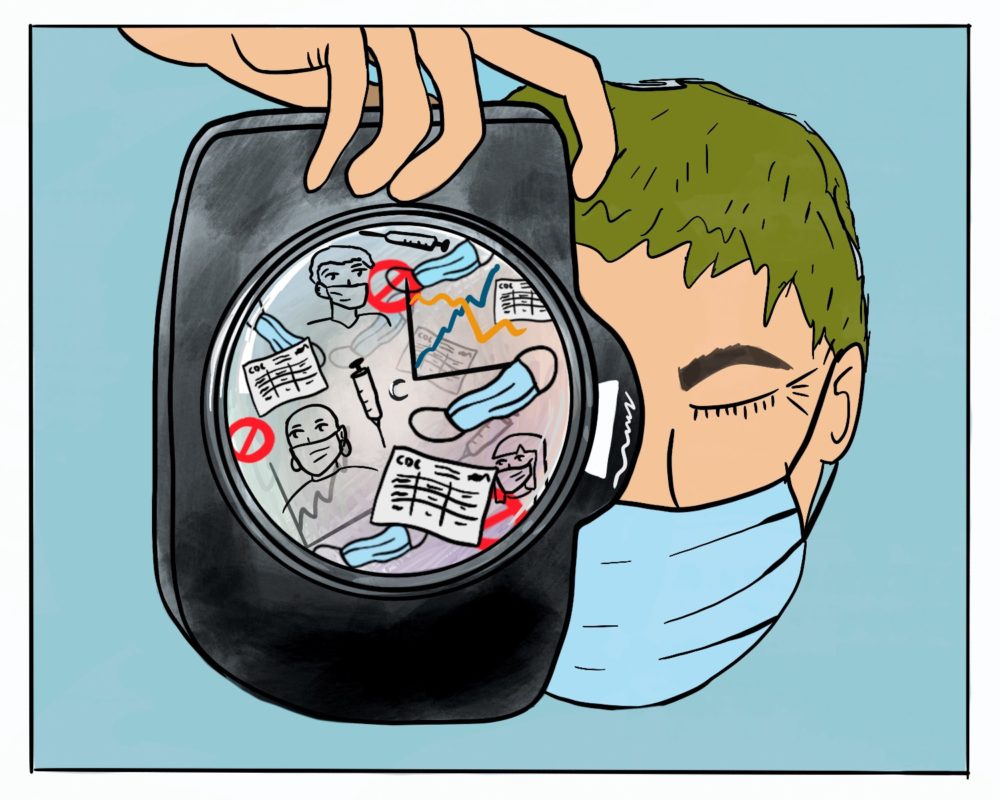The ongoing COVID-19 pandemic has affected everyone differently. Many people suffered huge losses, while some found new opportunities. Although we are almost two years from the start of the pandemic, it’s clear that we can’t go back to the way things once were any time soon. Artists in particular have had to make a lot of changes, but the art never stopped. The way that artists have adapted to the ongoing pandemic has shown the resilience of the arts community in Chicago, especially on the South Side. They’ve found ways to continue practicing their art to survive on various levels.
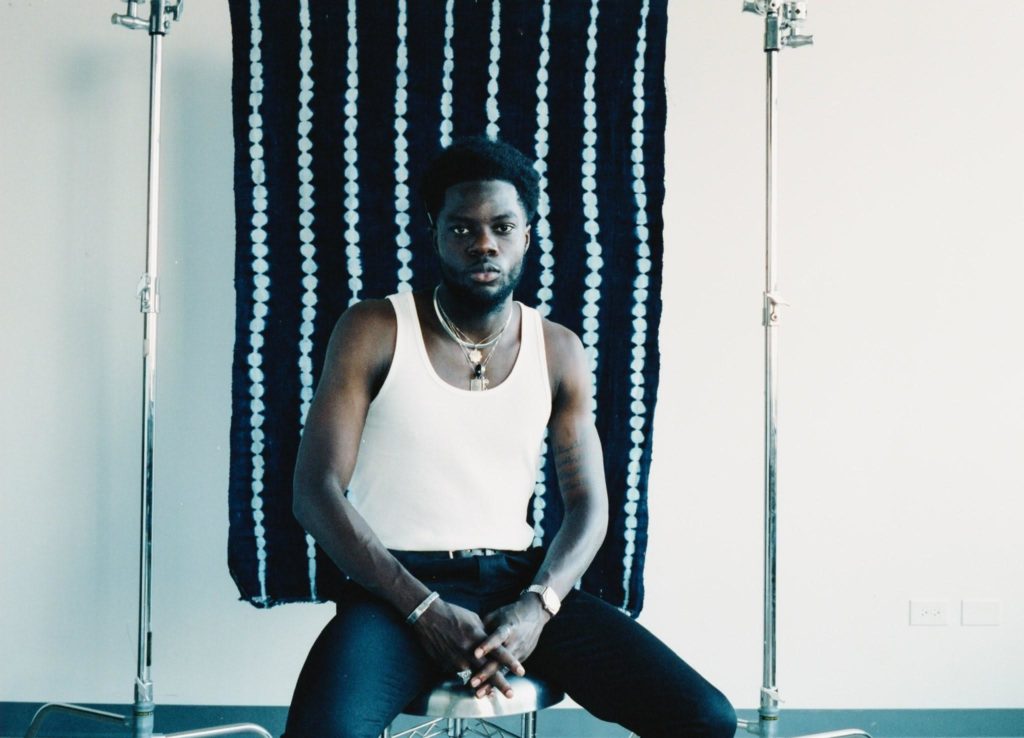
Femdot. is a rapper and founder of the non-profit Delacreme Scholars from Glenwood. He remembers getting ready for what he expected to be a breakout year right before the pandemic shut things down.
“I had just come off my first nationwide tour,” femdot. said. “I came back home, ready to get back on the road and was preparing for that … I was in and out of writing camps and sessions pretty consistently up until literally the week of the shutdown.”
He explained how during the first few weeks of the lockdown he was creating music nonstop, but as the pandemic persisted for months, femdot. put music-making on pause and focused on his community. “I wasn’t able to write as much, and, you know, figuring out how we should be helping people,” femdot. said. “‘Is there something else we could be doing right now?’”
During his pause on rapping, femdot. began focusing on grocery delivery initiatives with Delacreme Scholars. “So many other artists in the city were creating initiatives or just [being] outside trying to help people around that time,” he said. “That kind of became our community.”
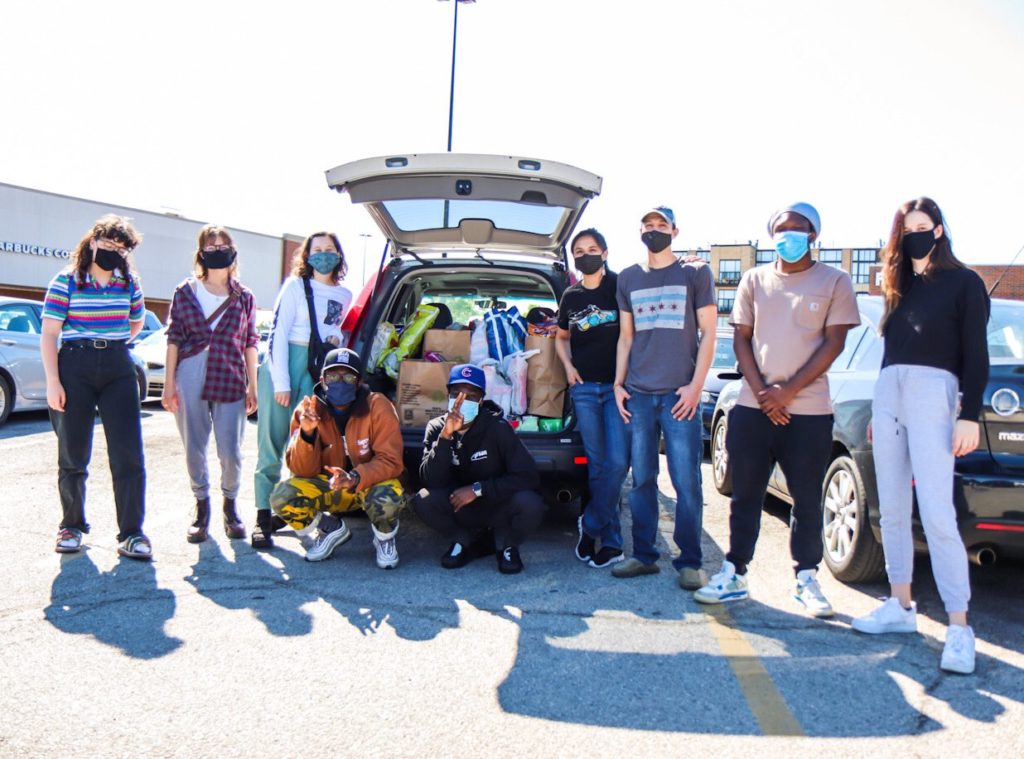
femdot. eased back into rapping by putting together Zoom sessions called “Sixteens,” where a rapper would write a verse in sixteen minutes and a producer would make a beat in sixteen minutes, and then combine their work. “That felt like the first time, like some sort of community, or like I was back in the studio just with the homies making music,” he said. “I think those “Sixteens” [sessions] really allowed me to sharpen my craft, but also kind of have me looking [through] the music lens again.”
femdot. started making music in the studio again near the end of the summer of 2020. He explained the new thoughts he had when he was in the studio getting ready to record. “‘Am I singing through the masks [or] getting my mask off, at least when I’m recording?’ The first couple of sessions were definitely kind of awkward and there was this underlying layer of paranoia of like, ‘does this person have COVID?’ You know, ‘if we’re all in a closed space now, can we all get COVID?’” femdot. recalled.
“We had our first show back in May 2021, and it went beautifully,” he said. “But, I know I was definitely thinking like, ‘damn, are [audience members] going to be super distanced? How would I get them to wave their hands? If they’re not in front of me, you know, can I do call and responses?’” femdot. said. But his anxiety about how the concerts would go eased up when he saw the show running normally, with the only change being masks.
Despite the success of his live performances during the pandemic, recent surges in COVID-19 cases have forced femdot. to postpone some shows. The rapper released his latest album NOT FOR SALE in November, and was set to perform his new music live at his first headlining show in Chicago—his hometown—since January 2018. He recalled not wanting his event to be a super-spreader event and risking the health of his fans.
“We ended up having to push [the show to] the start of March,” femdot. said. “We were supposed to have the show the same week CPS was shut down, and the Grammys were being postponed, and we were like ‘okay, we need to push this back.’”
Despite the uncertainty of the virus and its effect on everyone, femdot. is still pushing through with his creative plans. “If there’s nothing that 2020 has shown us, it’s that anything can change at any moment,” he said. “So I try not to put too much faith in all the plans I have, but understand that things will be okay.”
femdot. said he will continue to share more content for his album NOT FOR SALE, perform the headlining show for the album in Chicago, get back out on the road, and promote new merchandise for Delacreme Scholars’ Black History Month collection.
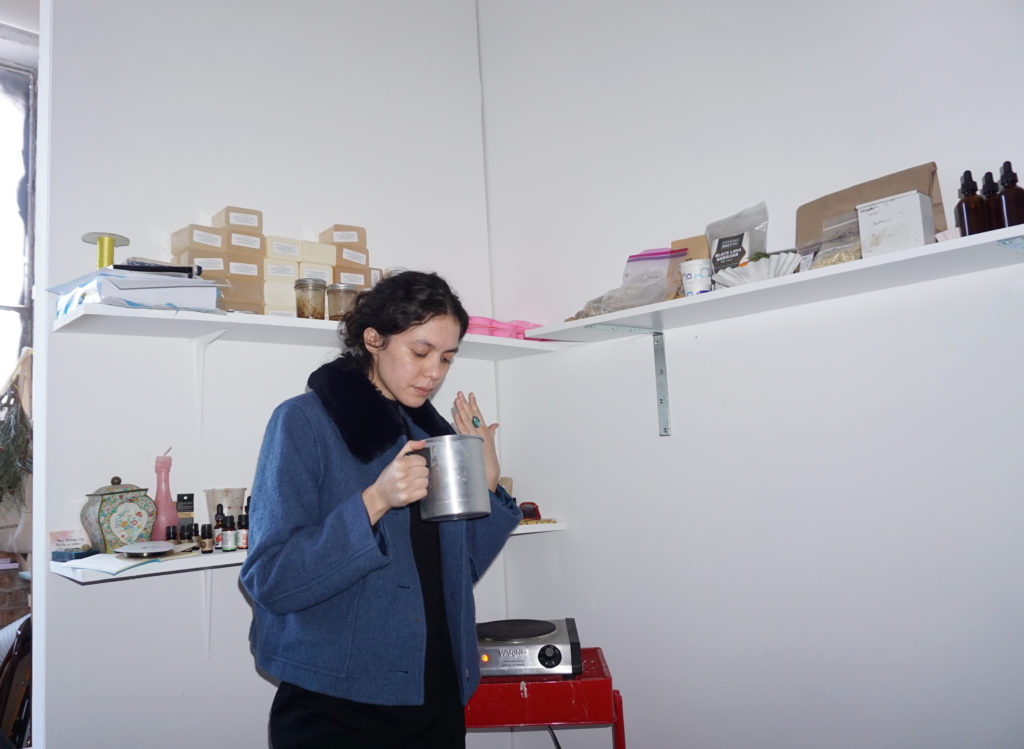
Angel Harrold is a photographer and soap maker who was raised in Pilsen and Hyde Park, and now resides in Bridgeport. Toward the beginning of the pandemic, Harrold had a studio where she planned to practice her photography, but the studio became more than that.
“The pandemic didn’t get any better, so I actually started making a lot of soap there,” Harrold said. “I also did portraits of people, like for music videos or like mixtape albums, and then I started approaching strangers and doing portraits of them as well.”
Harrold not only adapted as a photographer during the pandemic, but found a new passion that has become a small business for her. “I started making soaps early [in the] pandemic, and I always tell people I started because I was running out of soap and I was buying stuff I didn’t really like that much. So while I was cooped up at home, that was kind of a really good way to make stuff for people. I also actually learned a lot about starting a very small business through making soap,” Harrold said. “That’s been kind of a really cool thing to build on as I work on more projects.”
She still continued to do photography work, and Harrold explained the precautions she had to take while working on a photoshoot during a pandemic.
“I did one mixtape cover for Vic Mensa and that was at my studio with a group of people. We had temperature checks, we tried to keep people together for as few minutes as possible because it was still so early in the pandemic. We were honest with and upfront with everyone about all the precautions we were taking and I think overall made sure that everyone was comfortable,” Harrold recalled. “I feel like that was all we could do.”
“I think the adjustment part really came from mostly shooting outside or shooting people less, and overall just feeling like, ’All right, you know, the way that things were are really not the way they are anymore,’” Harrold said. “I think mostly being really honest and upfront with people and not being embarrassed to tell people like, ‘Hey, if you’re coming through, you need to wear a mask,’ and just establishing those boundaries made it a lot easier for me to work comfortably.”
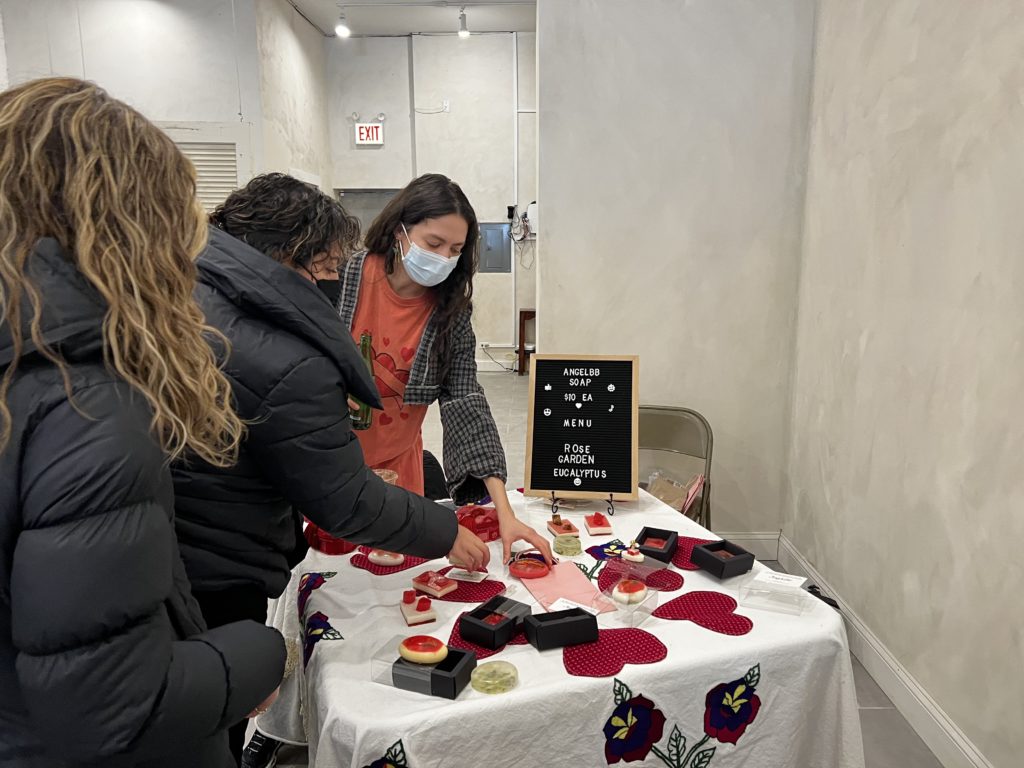
Harrold felt hopeful for the future of her artistic expression through photography and soapmaking. “I moved to Bridgeport because I saw this beautiful storefront and decided I was moving. So that is kind of like a thing, where I could have control over that. Whether I open up this [soap] store that’s in my head next month, two months from now, next year…I think I’m doing like the most with the control that I can have over a situation like a creative situation,” Harrold said.
“I don’t think it’s fair for people to have super high expectations of themselves given that this is a time we’ve never experienced before,” Harrold said.
Shaquille Roberts is a writer, director, and film producer from Englewood. When looking back at the start of the pandemic, Roberts recalled finishing her short film “Let Go” and planning its premiere gathering. The premiere sold out and she even had to turn people away, but it got canceled at the last minute.
“There was a lot of excitement leading up to it, so having to cancel it was super unfortunate,” Roberts said. The film eventually premiered virtually in the summer 2020 South Side Film Festival. Roberts said it was saddening to not be able to gauge the public’s reactions to her film as she would be able to at a live event.
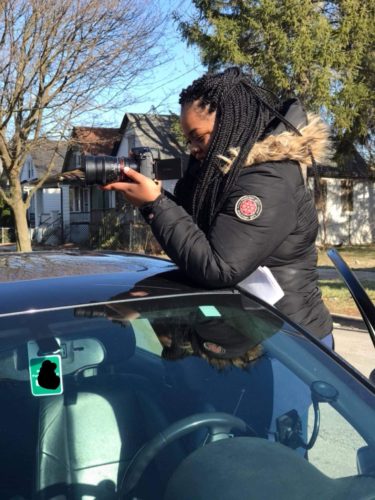
At the end of 2020 Roberts produced her film “Lucky Number Seven”, which premiered in-person at Black Harvest Film Festival. Roberts recalled that the event required proof of vaccination to enter, even before it was a mandate in Illinois. Although there were fewer people than previous Black Harvest festivals, it felt good to be back in person at a premiere.
There were a lot of precautions Roberts had to take on the sets of her productions. She began to rethink her production budget, including money to accommodate COVID precautions for people on set, such as testing and PPE.
“It’s hard being an independent [filmmaker] because you are already low on funds, and then need to pay for a COVID compliance person, [COVID-19] tests, and extra materials like masks and sanitizing,” Roberts explained. “Those things all add to your budget.”
Roberts found that the most challenging aspect of producing her films and TV pilot in the beginning of the pandemic was casting. “We did eight days of auditions virtually and it was horrible,” Roberts said. “It was great because we got great talent, but it was so hard to do virtual auditions because then we got on set and we actually saw these guys; some were shorter than we thought, some people were a little bit wider than we thought… so it was really hard to get a full picture of the way this person is and looks and interacts with another person virtually.”
Roberts feels optimistic about creating and shooting more productions in the future. “I don’t want to not tell stories,” Roberts said. “So my thing would just be to accommodate the situation we’re in now [rather] than to wait years and years to create, because I don’t think that’s realistic either.”
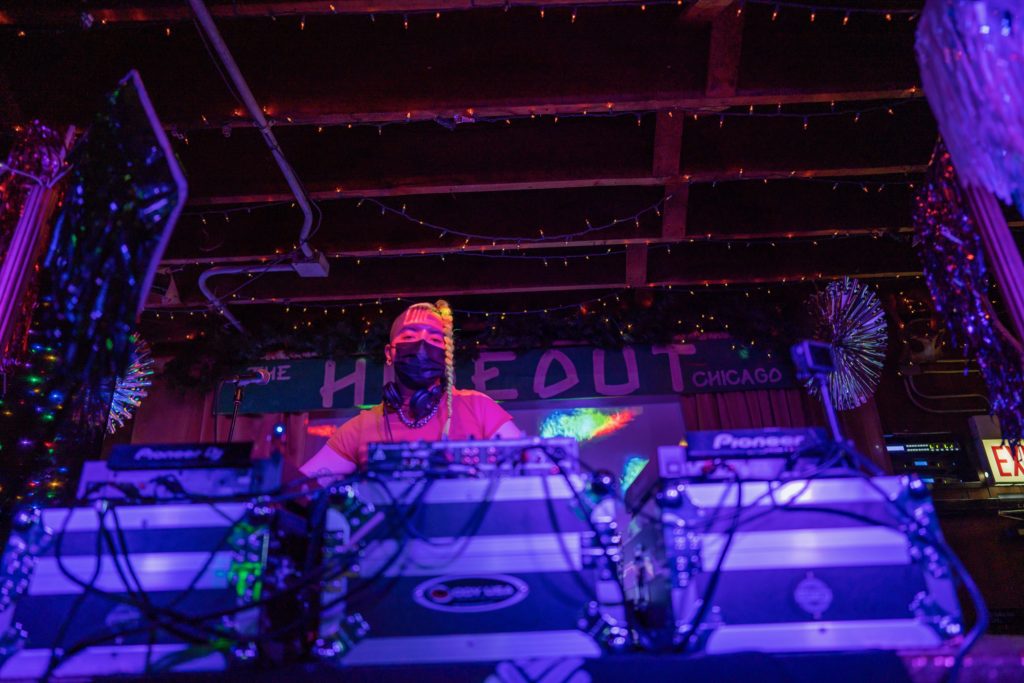
Natalie Murillo is a DJ, producer, and performer who lives in Back of the Yards. Murillo, also known by her stage name La Spacer, is co-founder of Trqpiteca, “an artist duo and production company creating spaces and opportunities for local and international artists who identify as queer, POC, and or allies.”
According to Murrillo, the music community was hit hard by the pandemic compared to other artists. “It’s just like, we’re not essential,” Murillo said.
With nowhere to DJ in person at the start of the pandemic, Murillo had to find sources of income elsewhere. “I was definitely applying for artist relief grants, emergency grants, and I was able to get some of those,” Murillo said.
During that time, Murillo said, she also honed her writing skills applying for grants. “I took a virtual grant writing class at the Hyde Park Art Center. So that was basically what I was doing. Like just sharpening my grant writing skills, which I don’t like to write,” Murillo said. “It was like a big push for me to do that.”
She survived the beginning of the pandemic the way many music performing artists did: through grants and relief funds, producing music for other artists, and streaming DJ sets virtually.
Murillo remembers when she started getting booked for gigs again in the summer of 2020. “I showed up to that [first] event, I had a mask on, there was one of those barricades around the DJ booth to not allow anybody to get near. So there were a lot of safety protocols,” Murillo said.
Murillo explained that once people were able to get vaccinated in 2021, although she still didn’t feel normal, she started to feel comfortable at the gigs. “It made me feel like things were starting to get back to normal, at least in the music world,” Murillo said. “I was like, ‘Oh, okay. There’s festivals, these huge stages, people are being safe, but it’s also safe because we’re outdoors.’”
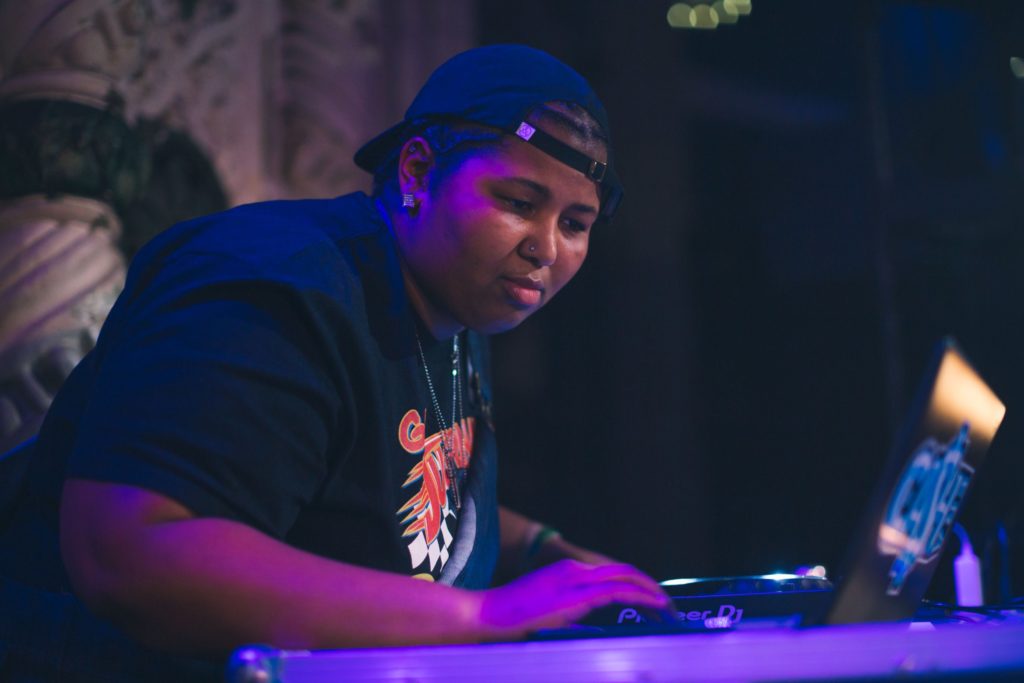
DJ Ca$hEra or CaSera Heining is a DJ from Sauk Village who has had to adapt to the COVID-19 pandemic as well. Heining recalls being at a high point in her DJ career, being consistently booked for multiple gigs, before the pandemic shut everything down. All of a sudden, CaSera’s gigs were being postponed and ultimately canceled. “There was no insight as to what was going on, so then I started finding ways to DJ virtually,” Heining said. “I was just doing that different days of the week… just random sets.”
Dedicated to continuing her craft—even if it was virtually—Heining even turned a bedroom of her home into a studio that she could stream out of. There she streamed her DJ sets and practiced her art even more. “I also took the time to learn how to make my own DJ edits,” Heining said, and she did so through virtual classes at Hyde Park Art Center. “Then I started working a lot more on my blends and things of that nature. So I definitely spent more time practicing and learning different things.”
Heining remembered when she was able to start booking more outdoor gigs a few months into the start of the pandemic in 2020, and how she then started to think about the conditions of the events. “I was like, ‘what do I have to do to stay safe? What is the venue doing to make sure that everybody inside is going to be safe as well?’” Heining would ask herself. “‘What are we doing as a collective to make sure it’s okay for us to gather under these conditions?’”
Heining continued to get booked in 2021 through residences and is currently DJing branded events. She plans to stay outside this year and continue to DJ while trying to stay safe as best as she can.
Heining isn’t stressing anymore about where the pandemic will take her art. “I wouldn’t say I’m worried about this year at all. We gonna ride it out,” Heining said. “I guess my view on it is like, I’m not gonna stress about what hasn’t happened yet.”
Artists have had to adapt to the pandemic and continue to create and perform, and although it’s unclear what the future will look like, what is clear is the resilience of the South Side artistic community.
Isabel Nieves is the arts editor for the Weekly

